#THE HUNDRED THOUSAND KINGDOMS BY N.K. JEMISIN
Explore tagged Tumblr posts
Text
"All fantasy authors have to start somewhere. The best debut fantasy books ever written are a testament to what that starting line can look like. In fantasy, the delicate dance between worldbuilding, character, and craft is always difficult. Somehow, these authors got it just right with the first books they had published."
#THE 20 BEST DEBUT FANTASY BOOKS EVER WRITTEN#DEBUT FANTASY BOOKS#fantasy#book list#THE HOBBIT BY J.R.R. TOLKIEN#ROCANNON’S WORLD BY URSULA K. LE GUIN#KUSHIEL’S DART BY JACQUELINE CAREY#ELANTRIS BY BRANDON SANDERSON#ROSEMARY AND RUE BY SEANAN MCGUIRE#THE HUNDRED THOUSAND KINGDOMS BY N.K. JEMISIN#THE NIGHT CIRCUS BY ERIN MORGENSTERN#SORCERER TO THE CROWN BY ZEN CHO#JADE CITY BY FONDA LEE#THE RAGE OF DRAGONS BY EVAN WINTER#THE POPPY WAR BY R.F. KUANG#TRAIL OF LIGHTNING BY REBECCA ROANHORSE#WITCHMARK BY C.L. POLK#THE EMPRESS OF SALT AND FORTUNE BY NGHI VO#THE UNBROKEN BY C.L. CLARK#SHE WHO BECAME THE SUN BY SHELLEY PARKER-CHAN#A MARVELLOUS LIGHT BY FREYA MARSKE#THE FINAL STRIFE BY SAARA EL-ARIFI#KAIKEYI BY VAISHNAVI PATEL#THE JASAD HEIR BY SARA HASHEM
12 notes
·
View notes
Text
Yeine just had sex with two different people in one night (not a threesome, one after the other). Girl, how can you walk?
15 notes
·
View notes
Text

6 notes
·
View notes
Text



"In a child's eyes, a mother is a goddess. She can be glorious or terrible, benevolent or filled with wrath, but she commands love either way. I am convinced that this is the greatest power in the universe."
~N.K. Jemisin, The Hundred Thousand Kingdoms (Inheritance, #1)
#photography#beauty#quote#photo dump#personal#bowling#colorful#texture#N.K. Jemisin#The Hundred Thousand Kingdoms (Inheritance#1)#strength#motherhood#childhood
1 note
·
View note
Text



N.K. Jemisin, The Hundred Thousands Kingdoms
kai @miwtual’s birthday countdown event Day 19: Typography
#rhaenyra targaryen#aegon ii targaryen#house of the dragon#hotd#hotdedit#rhaenyratargaryenedit#aegoniiedit#usermaguire#userellenberent#useralicia#tuserlivia#userzaynab#usermalcfoy#usergif#targaryensource#rhaenyratargaryencentral#aegoniidaily#photopeablr#welightthewaysource#my gifs***#this is a bit late but i have wanting to make this set for months now#and this prompt finally gave a chance to do it#tw glitching#tw flashing
62 notes
·
View notes
Text
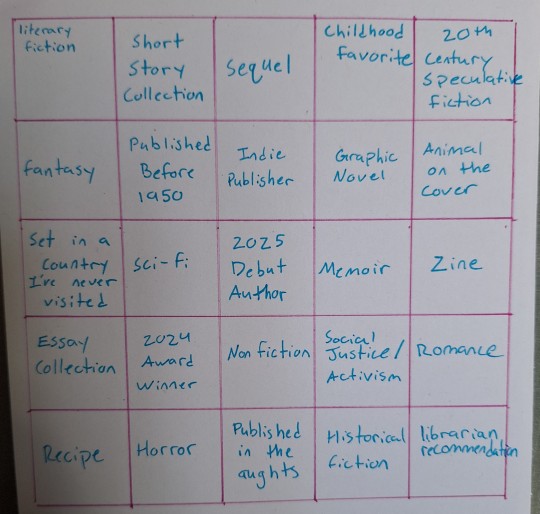
Taking on @batmanisagatewaydrug 's 2025 Book Bingo (along with my wife & housemate, so it's now on our fridge. Taking me back to summer reading lists from the library)
I tend to work down my to-read list in order, unless there's something I really want to get to, so most of this list is 'what's the first thing I'll hit that fills the criteria'. But some books earn the right to skip the line, for one reason or another.
Going for a full board, which means actual bingo might take a minute lol
List below-
Literary Fiction - TBD
Short Story Collection - Friday Black by Nana Kwame Adjei-Brenyah. Chain-Gang All Stars was on my top 10 from 2024 so even though short stories and I don't tend to get along, this one I'm excited about. Will also try Drinking From Graveyard Wells by Yvette Lisa Ndlovu
Sequel - Either A Victory of Eagles by Naomi Novik or Heavenly Tyrant by Xiran Jay Zhao. A matter of which one I get first; My library doesn't have physical copies of Heavenly Tyrant yet, and my wife owns all of Temeraire, so it might win.
Childhood Favorite - Might be Watership Down by Richard Adams, which is always a banger, but I reread Watership just a couple years ago, so it might be The Book of Three by Lloyd Alexander instead, which I read many times with my mom and still have the whole series of.
20th Century Speculative Fiction - TBD
Fantasy - A Taste of Honey by Kai Ashante Wilson. I read so much fantasy, BUT I already have A Taste Of Honey on my side table. So here we are.
Published Pre-1950 - The Iliad (and The Odyssey) translated by Emily Wilson. Heard a lot of noise about her translation, and haven't read these two since... idk but it's been over a decade. Also going to hop on the Rebecca by Daphne du Maurier train.
Indie Publisher - The Hundred Thousand Kingdoms trilogy by N.K. Jemisin. I read a LOT of indie publishers and Jemisin if one of my all-time favorite writers. I've been putting off this series for a time I can really get into it and burn down all three.
Graphic Novel - Dorohedoro by Q Hyashida. Currently on volume 8, will probably finish the series in the next week or two. Love love love Hyashida's work
Animal on the cover - Plague Dogs by Richard Adams. Despite my aforementioned childhood obsession with Watership Down I never got around to Plague Dogs. Looking forward to it!
Set in a country I've never visited - TBD
Sci-Fi - Another genre I'll read a thousand of in a year. Currently I have Ancillary Justice by Ann Leckie on my side table (which I fear may be mid, but time will tell) I'm also VERY excited to read The Spare Man by Mary Robinette Kowal
2025 Debut Author - TBD
Memoir - Love Is An Ex-Country by Randa Jarrar. Memoirs aren't usually my thing, but this one made it's way onto my to-read list last year so this is good motivation.
Zine - TBD. Browsing all the other posts from people doing this challenge for recs
Essay Collection - How To Read Now by Elaine Castillo. Literally the only essay collection on my to-read list and it jump scared me. Thought for sure this would a TBD, but How To Read Now should be interesting.
2024 Award Winner - TBD. Will trawl award lists when I have time
Non-Fiction - Facing the Wave: A Journey in the Wake of the Tsunami by Gretel Ehrlich. Specifically chose something that doesn't also count as social justice/activism, which is most of my non-fiction reads. I've found a real appreciation for good non-fiction the last few years (Everyone go read Swimming to Antarctica by Lynne Cox). Learning stuff is cool!
Social Justice/Activism - Everything you Love Will Burn: Inside the Rebirth of White Nationalism in America by Vegas Tenold. Excited for this one.
Romance - TBD. Tend to read romance that's also another genre (romantasy side eye at myself) so I've inevitably got one on my list. But maybe Akwaeke Emezi will write another romance and sweep me off my feet.
Recipe - Steak wrap pinwheels. My wife has been watching Food Truck Race (lol. lmao even) and one of the contestants made these. Stealing the idea with impunity.
Horror - Fever House by Keith Rosson. I've got a rich vein of horror novels on my to-read list, but this will be one of the first.
Published in the Aughts - TBD I'm old. I read of lot of 00's work.
Historical Fiction - Velvet Was The Night by Silvia Moreno-Garcia. Is the 70's historical? I think the 70's is historical now. One of the final 3 books of Moreno-Garcia's I haven't read, and she's never let me down. Might read another Phryne Fisher Mystery or two as well, because they're quick and fun.
Librarian recommendation - TBD. I love my library and there's a few librarians who know me, will have to ask their opinions. Talking to a person! Not just taking one off the recommended shelf! Wild!
40 notes
·
View notes
Text
Well, again, the issue is not that Rhys has done bad things, it’s how those actions are framed in the story. Let’s think about this – if Rhysand’s actions UTM were framed as negative then perhaps we would not be having this conversation.
Of course, we can argue that Rhysand (1) has developed negative coping mechanisms / perspective (2) Rhysand’s trauma informs the things that he does (both pre, during, and after UTM), and (3) Rhysand’s position was uniquely isolating because of the nature of the role he was forced to play. These are points that I believe can be argued and offer an interesting view; but for any of that to happen, we have to acknowledge that the behaviors are negative. That’s often the problem with the arguments that begin to arise – no one wants to admit that Rhysand has developed (or just has) negative qualities and behaviors. No one wants to contend with the reality of consequences. “Rhysand has always admitted that he would be willing to do terrible things for his family” – and yet there’s no elaboration on those “terrible things.” No one wants to talk about those proposed negative qualities. The story (and the audience) don’t want to admit that Rhys doesn’t really have a solid moral high ground over Tamlin, or admittedly other villains. Just because Rhysand “admits” he’s prone to basically being abusive doesn’t…make it any less abusive.
My proposed argument about Rhysand’s actions UTM are this: he chose to sexually assault Feyre, he chose to “protect” Feyre in ways that were extremely sexually explicit. I believe these are choices that Rhys chooses to make – and I believe they say something about him. It’s noted, to me, that Amarantha scarcely makes Rhys do anything that he does to Feyre. I also believe that his actions regarding Feyre were done with an air of autonomy; as in, I believe Rhysand takes these measures into his own hands. Ultimately, I believe that while Rhysand has to contend with the horrors, he himself becomes beholden to them at some point and ends up perpetrating the same behaviors.
We cannot argue that Rhysand sexually assaulted Feyre, and then argue that it doesn’t say something about him. It does. In the realm of the story – from a writing standpoint – I think a good author can still make a character like that sympathetic and understandable (see: Nahadoth and Itempas from N.K. Jemisin’s Hundred Thousand Kingdom). If I were analyzing Rhysand’s actions, I would simply make the argument that perhaps Rhysand’s abuse of Feyre mirror’s his own abuse by Amarantha hands, and he potentially sees Feyre (and her hope) as something to be threatened – or even shamed by. If Rhysand’s actions were written in a way that clearly exemplified that his actions are not meant to be praised (and are NOT are reflection of love) then he could be salvaged. I actually believe a lot of the abusive things Rhysand does makes sense given the environment and if the story leaned into this from a storytelling perspective and did away with needing to moralize, then this would all be fine. Framing Rhysand’s abuse of Feyre as something to be praised, admired, and loved for is actually quite insane. If we frame his actions as purely preservational and self-serving, that would make so much sense. Imagine being in Rhysand’s position; I guarantee everyone would do whatever they could to stop such extreme amounts of abuse and sexual violence. And even then, the story could still create a narrative that warns of the danger of sexual violence and consent, it would just be subtextual and more allegorical than concretely written in the text. Starting Feyre and Rhysand off in such a tragic place, having Feyre and Rhysand acknowledged truly what happened, having them discuss ways for both of them to move forward while building up the mating bond in the background. Have Feyre acknowledge this untrusting, sly, slick part of Rhysand and have her not assume her mate does everything out of the kindness of his heart. Build their romance out of a place of mutual atonement – play on the theme of guilt Feyre feels and the whole premise of the court. Let the connection between Feyre and Rhys be that they truly acknowledge each others darkness (and also let Feyre do selfish things – maybe she knew damn well Clare Beddor’s family might suffer a bad fate but its not her family and Feyre would do anything for them; Let Feyre kill those fairies with ease because she cares about her life. Let her contend with reality that she would actually do anything for her family and then have that be a connection between Rhys and Feyre.
Something that has always bothered me about the “we don’t talk enough about Rhysand’s trauma” argument that gets thrown around when we earnestly discuss the validity of his actions is the presumption of innocence in that statement. The unwritten statement is that the trauma somehow explains and simultaneously absolves him of the implications of his actions. I objectively agree with the sentiment – Rhysand’s trauma is not talked about enough and it should be. The argument dancing in the corner is the fact that people believe that Rhysand’s extreme amount of trauma absolves him – even going as far as essentially say that Rhysand’s abuse operates out of fear (or because of fear) which is essentially the exact same ideology the book bashed Tamlin for. In the end, the cycle just comes back around and the abuse gets pushed into the backdrop.
#anti sjm#anti rhysand#anti feysand#anti feyre#anti acosf#anti acomaf#this is more of an analysis of character than anti character rant#I’m just tired of people trying to essentially disregard that rhysand has done bad things#while simultaneously trying to make justification for it
112 notes
·
View notes
Note
Just because it seems like your style, have you ever read anything by N.K. Jemisin? I just finished The Hundred Thousand Kingdoms and the protagonist reminded me of a post of yours, about a type of character who tries, against the environment, against their own flaws, to be competent, and it definitely colored my perception of the book.
Yes, I haven't read that one (it's on my list, so good to know!) but I've read the Broken Earth trilogy and The City We Became/The World We Make (and the short story on which that was originally based).
7 notes
·
View notes
Text
Book recs: great, unique and creative worldbuilding in fantasy books
A note: this is very much a subjective list. I typically do not care much for historical medieval-esque settings (though seeing as I'm a big critical role fan, obviously there are exceptions), but rather prefer settings that mix up historical and modern, fantastical and scientific, and make up entirely new things and societal structures not based on our world.
Other book rec posts:
Really cool sci-fi worldbuilding
Mermaid books
Dark sapphic romances
Vampire books
Without further ado, let’s go!
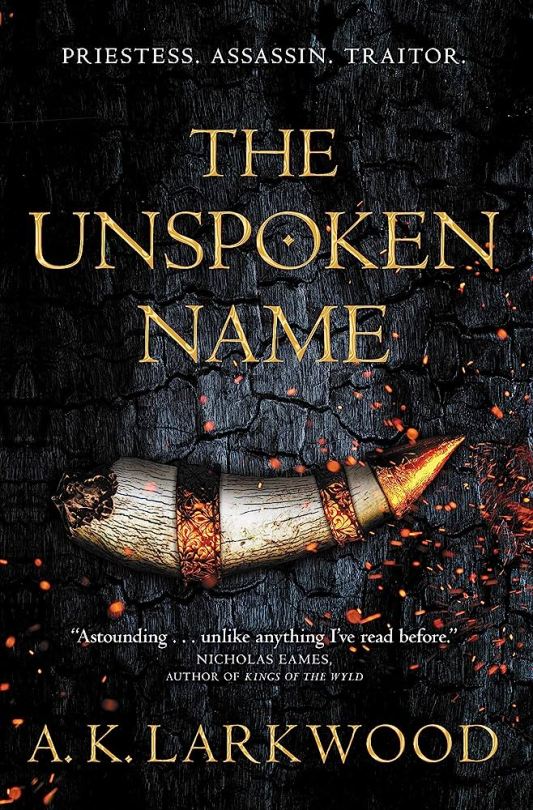

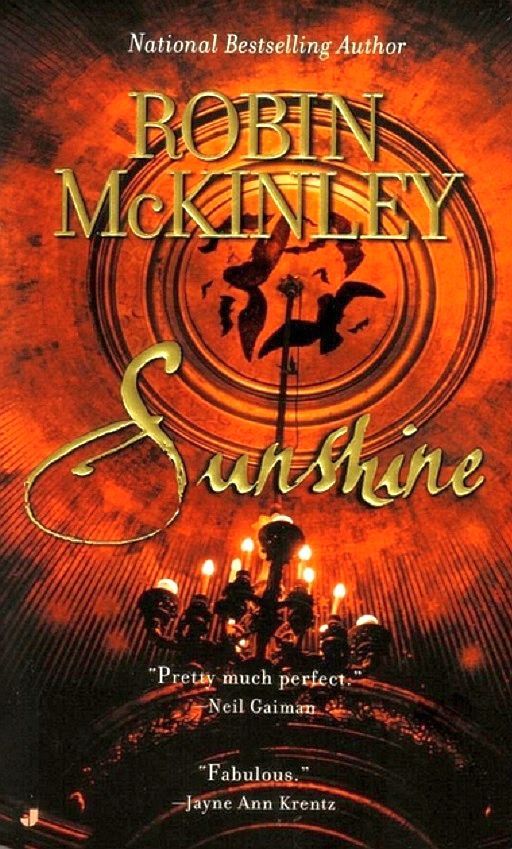
The Unspoken name by A.K. Larkwood
Honestly there's so much going on in this one worldbuilding-wise that it's kind of hard to explain. Portals, flying ships, orcs, elves, creepy snake gods, cults, immortal evil mages who traumatize teens as their hobby. It's also very queer!
A Master of Djinn by P. Djèli Clark
Set in an alternate 1910's steampunk Cairo, where djinn and other creatures (among other things, creepy steampunk angels) live alongside humans. We get to follow an investigator as she races to catch a criminal using a powerful object to control djinn and stir unrest. Fantastically creative and fresh, and also features a buddy cop dynamic between two female leads as well as a sapphic romance.
Sunshine by Robin McKinley
Urban fantasy on a level of its own, where dangerous magic exists alongside humans. It keeps you guessing and much is left unexplained; if you want clear answers and explanations to everything you might be disappointed, but if you want a world that feels mysterious and dangerous and lived in you'll probably like it. It follows a baker who, after getting kidnapped by vampires, gets embroiled in a dangerous struggle.
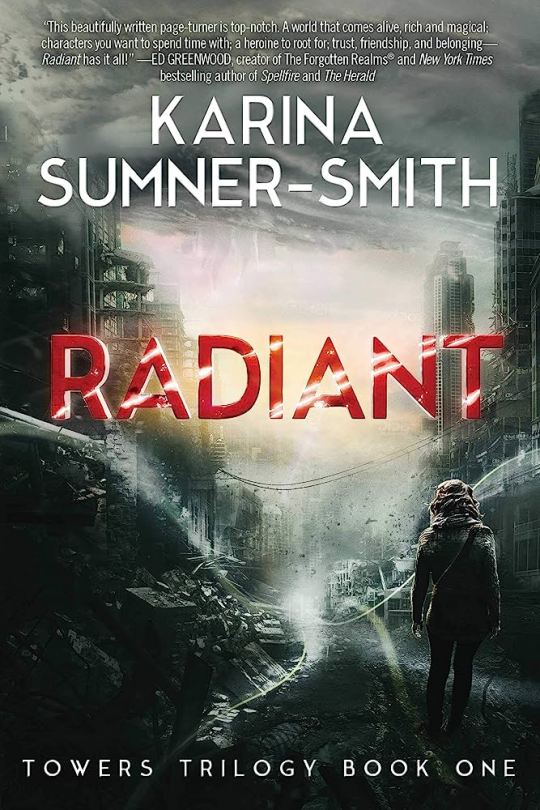
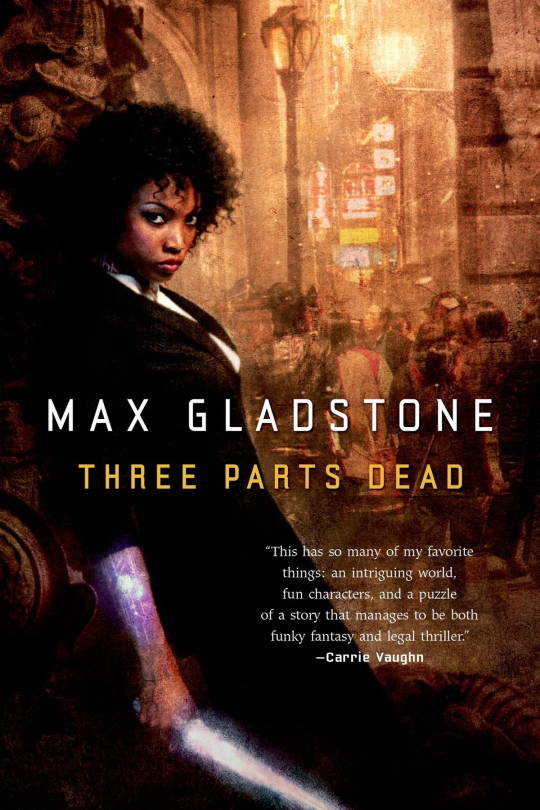
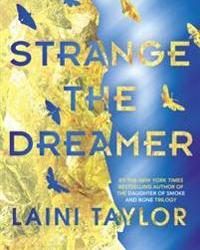
Radiant (Towers Trilogy) by Karina Sumner-Smith
A strange mix of fantasy, sci-fi and post apocalyptic, Radiant follows a girl without magic in a world where magic is currency. Those with much of it live in magically floating towers, while everyone else scrambles to survive in the ruins of an old city left devastated from an unknown cataclysm. The setting is creepy and mysterious and leaves me itching as I want to dig for more. Also there are ghosts.
Three Parts Dead (Craft Sequence) by Max Gladstone
This is one of those books where you just kind of have to let go and go along as it throws you all over the place. I started reading it expecting an urban fantasy, but it is much more and wholly unique. It features a world where gods and magic are deeply enmeshed with society at large, and a base of much of its technology and progress. It doesn't quite feel historical, but also not modern, but rather like you took a fantastical world and let it develop naturally into its own contemporary era.
Strange the Dreamer (Strange the Dreamer duology) by Laini Taylor
One of my favorite things is when the mysteries of the world and how it works become part of the plot, with characters trying to figure out their own world. Strange the Dreamer is beautiful and complex and will hurt your heart. Personally I didn't care much for the central romance, but the wonderful characters, themes, mysteries and world make up for it.
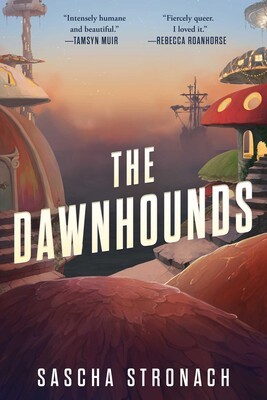

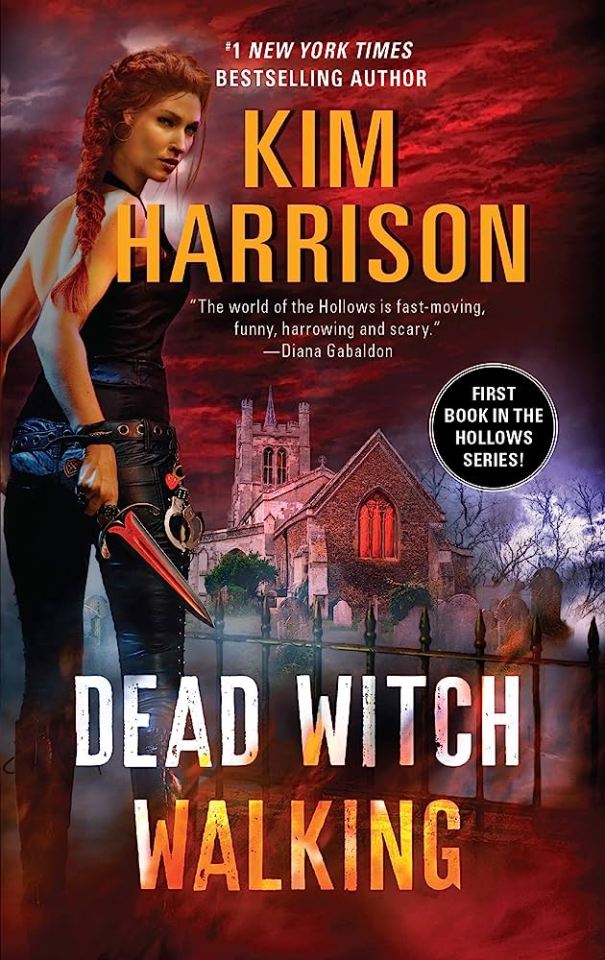
The Dawnhounds by Sascha Stronach
Like Three Parts Dead, The Dawnhounds is a book where you just kind of have to let the story and the world wash over you. It skirts the line of scifi and fantasy, with a futuristic world of environmentally friendly mushroom houses and deadly fungi bio weapons next to literally god-given superpowers and near-immortality. It's really cool and unlike anything else I've ever read. Bonus: it’s also sapphic!
The Hundred Thousand Kingdoms (Inheritance Trilogy) by N.K. Jemisin
Another example of a world that feels wholly like its own organically developed thing, with societal structures developed around the magical aspects and a presence of gods and demi-gods, many of whom walk the streets and will smite you if you piss them off.
Dead Witch Walking (The Hollows series) by Kim Harrison
Okay, here we have an actual urban fantasy. While I got a bit worn out by the many, many love interests throughout the series, the worldbuilding is simply phenomenal and relies heavily on a well-developed alternate history. Basically, magical beings such as vampires, werewolves, elves, fairies, witches, etc, used to exist secretly alongside us, but when humanity delved into genetic research instead of the space race during the cold war, an engineered virus ended up wiping a good chunk of us out and the magical beings stepped in to stop us from going extinct. Now in the modern day, we co-exist but tensions remain. Our main character is a witch who, alongside her roommates (a vampire and a fairy) solve mysteries and crime and end up unveiling secrets about their world centuries in the making.
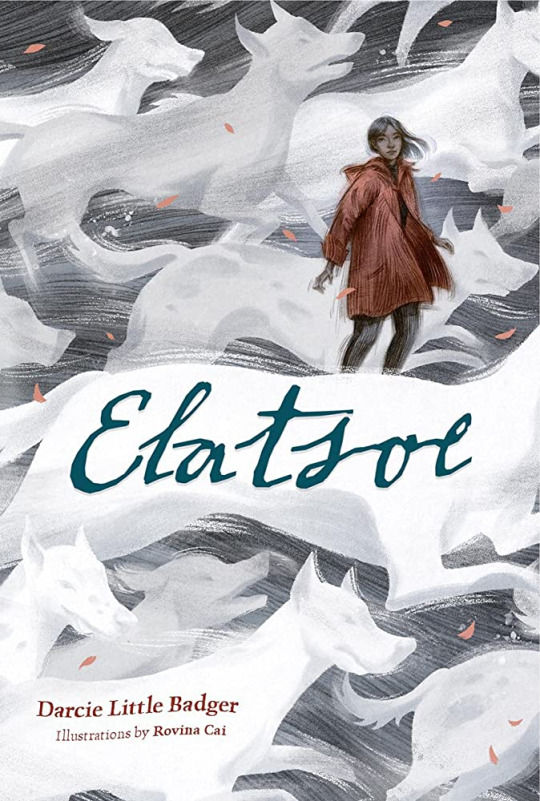

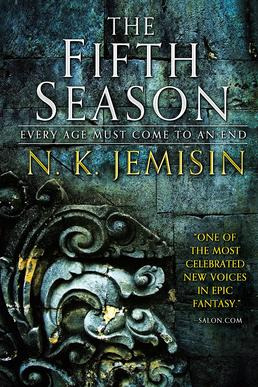
Elatsoe by Darcie Little Badger
Another urban fantasy, this one aimed at young adults and featuring indigenous mythology alongside creatures such as vampires and ghosts. We follow a young apache girl with the ability to raise ghosts as she works to solve the murder of her cousin.
Red Sister (Book of the Ancestor trilogy) by Mark Lawrence
Honestly, most of what I've read by Mark Lawrence so far could be featured on this list (special shoutout to his Broken Empire trilogy!). We follow a young girl training to become an assassin in a slowly dying world, where ice is overtaking the land and only a small band along its middle is habitable, kept alive by a mirror in the sky sharpening the dying sun's light. Question is, how long will this machine last, and what even is it? Very dark but very good.
The Fifth Season (The Broken Earth trilogy) by N.K. Jemisin
Listen, N.K. Jemisin gets to have two books on this list, okay, she is very good at what she does. In a world regularly torn apart by natural disasters, a big one finally strikes and society as we know it falls, leaving people floundering to survive in a post apocalyptic world, its secrets and past to be slowly revealed. We get to follow a mother as she races through this world to find and save her missing daughter.
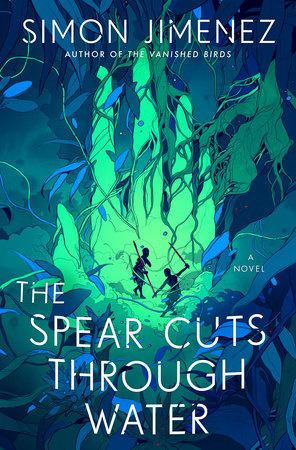
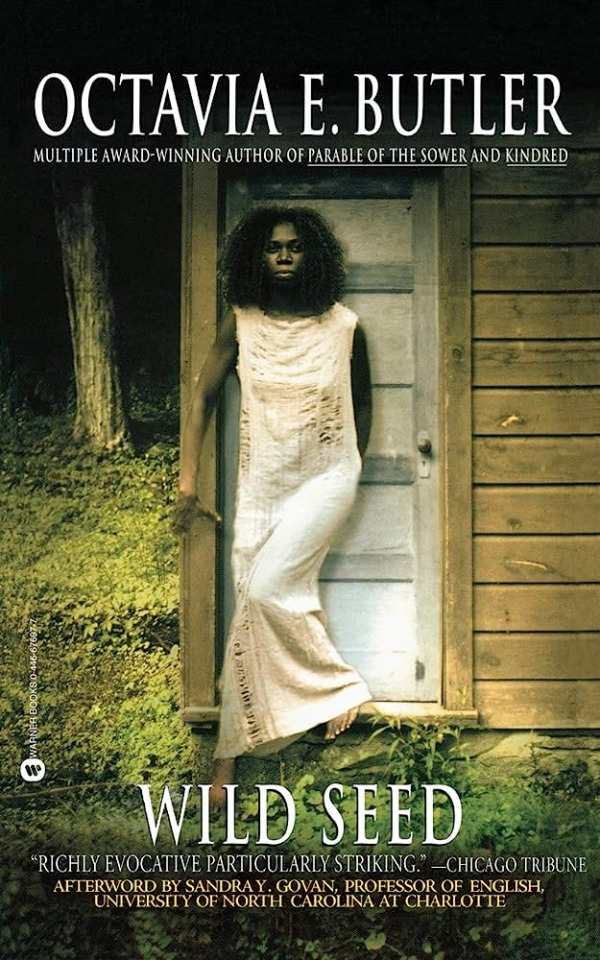
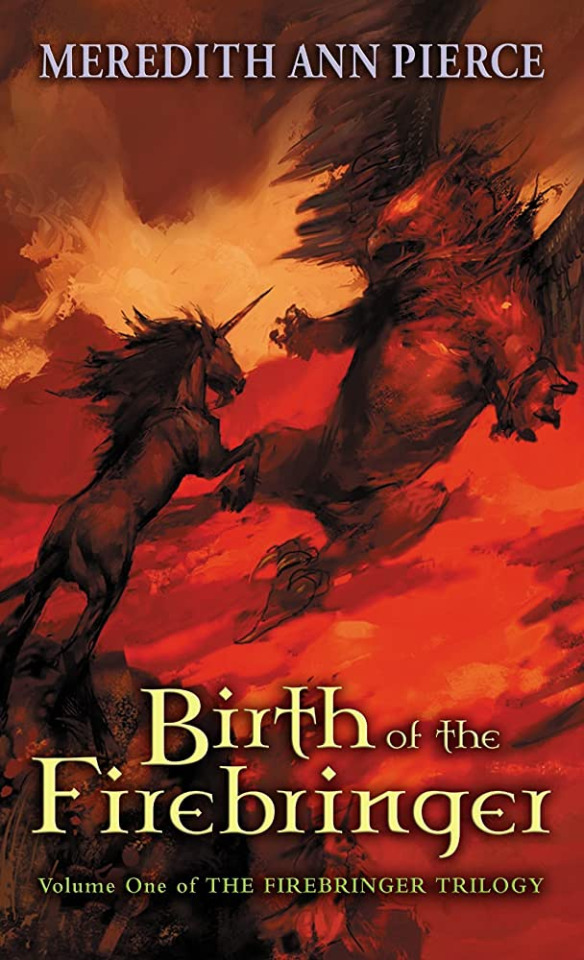
The Spear Cuts Through Water by Simon Jimenez
AKA the book the killed me. Two boys travel throughout their land with the body of a god as her horrible, horrible children try to hunt them down. It's hard to explain more than that, but trust me when I say the narrative voice and literary techniques are incredibly unique in how they blend past and present, reality and story, lead and bystander. Truly an experience. Bonus: gay romance!
Wild Seed by Octavia Butler
Master of slightly fucked up romance, Octavia Butler knocks it out of the park in this story featuring two immortals struggling throughout the centuries. What do you do when there is only one other person remotely like you, and you simultaneously can't stand them and can't live without them? Apparently, you turn yourself into a dolphin for a while.
Birth of the Fire Bringer by Meredith Ann Pierce
Cards on the table, it has been a great many years since I actually read this, and just as many years spent meaning to read the sequels (I have a lot of stuff on my tbr okay, don’t judge me), but I do remember it making a great impact on me back in the day. Our main character is a unicorn! Fighting wyverns and gryphons! How cool is that!
Bonus AKA I haven’t read these yet but they seem really cool


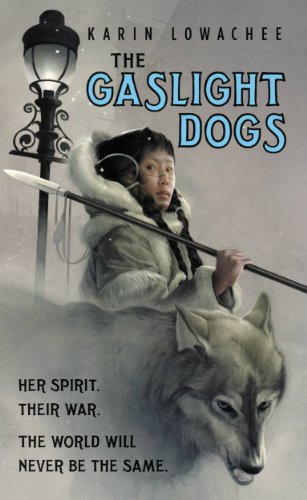
The Surviving Sky by Kritika H. Rao
From Goodreads: This Hindu philosophy-inspired debut science fantasy follows a husband and wife racing to save their living city—and their troubled marriage—high above a jungle world besieged by cataclysmic storms.
High above a jungle-planet float the last refuges of humanity—plant-made civilizations held together by tradition, technology, and arcane science. In these living cities, architects are revered above anyone else. If not for their ability to psychically manipulate the architecture, the cities would plunge into the devastating earthrage storms below.
Clean Sweep by Ilona Andrews
Urban fantasy but the vampires are aliens? Sign me the fuck up
The Gaslight Dogs by Karin Lowachee
From Goodreads: At the edge of the known world, an ancient nomadic tribe faces a new enemy-an Empire fueled by technology and war.
#thanks tumblr for fucking me over and posting the draft before i was done#anyway its finished now sorry for the confusion#nella talks books#long post#book recs
131 notes
·
View notes
Text
Book Bracket: Favorite Novel by a NaNoWriMo Pep Talker
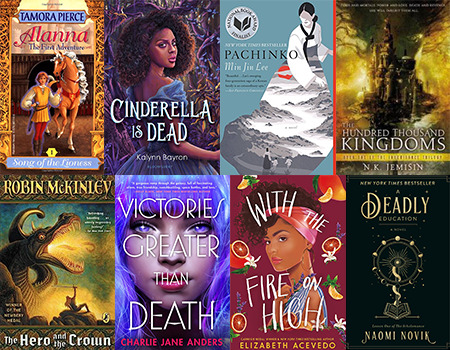
Did you know that nearly 70% of NaNoWriMo writers are women? This year for Women's History Month, we've gone through our list of NaNoWriMo Pep Talkers to find some of our favorite books written by women and featuring a strong female protagonist. In the spirit of March Madness, here's a just-for-fun book bracket featuring eight of our favorites. Which is yours?
To vote, choose your favorite on each individual poll that will be posted separately and linked below. We'll tally up the votes for all three rounds to find out which book you all like best!
We think all of these books are fantastic, and you should check them all out. If you want to see our full list of Pep Talk authors and read their inspiring messages, you can find them at https://nanowrimo.org/pep-talks
Round 1: Alanna: The First Adventure by Tamora Pierce vs. Cinderella is Dead by Kalynn Bayron: Vote in Poll 1.1 Pachinko by Min Jin Lee vs. The Hundred Thousand Kingdoms by N.K. Jemisin: Vote in Poll 1.2 The Hero and the Crown by Robin McKinley vs. Victories Greater Than Death by Charlie Jane Anders: Vote in Poll 1.3 With the Fire on High by Elizabeth Acevedo vs. A Deadly Education by Naomi Novik: Vote in Poll 1.4
#nanowrimo#book bracket#march madness#pep talks#by nano hq#poll#tamora pierce#kalynn bayron#min jin lee#nk jemisin#robin mckinley#charlie jane anders#elizabeth acevedo#naomi novik
127 notes
·
View notes
Text
i desire violently- and wait chapter 18 update info
the new chapter will be posted today (1/31). normally, it goes online around 12-1pm US EST time, but since i want to give everyone enough time to vote on the poll, i am going to wait until 5-6pm US EST time.
i also have pneumonia, so edits are taking a bit longer.
in the meantime, here are a few quotes/poems i’ve seen online that make me think of rosekiller, regulus, and surprisingly- remus lupin (angst mostly).

"nothing ever ends poetically. it ends and we turn it into poetry. all that blood was never once beautiful. it was always just red." - kait rokowski (this reminds me of remus lupin)
"is that all you want to be? liked? wouldn't you rather be passionately and voraciously desired?" - margaret atwood, bodily harm (but it's just barty's internal monologue)
"we can never be gods, after all- but we can become something less than human with frightening ease." - n.k. jemisin, the hundred thousand kingdoms (and it's regulus talking to barty after they got the mark)
"your worst sin is that you have destroyed and betrayed yourself for nothing." - fyodor dosteovsky, crime and punishment (but it's regulus' last thought as he gets pulled into the depths of the lake by inferi)
"i have survived everything, but i fear that i cannot survive myself." - cynthia chapman (remus remus remus)
"yes, there is something uncanny, demonic and fascinating in her." - leo tolstoy, anna karenina (but it's just evan thinking about barty)
"you can't force someone to choose you. you can't force someone to love you." - unknown (unrequited rosekiller, but specifically in an au where bartylus are endgame)
"crawl inside this body- find me where i am most ruined, love me there." - rune lazuli (barty begging to be loved by either evan or regulus tbh)
"if my parents' relationship was a representation of love, then i wanted no part of it. i would rather be alone." - unknown (literally regulus, evan, barty, and sirius)
#barty crouch jr#evan rosier#rosekiller#regulus black#remus lupin#marauders#marauders era slytherins
3 notes
·
View notes
Text
“We can never be gods, after all-but we can become something less than human with frightening ease.”
—N.K. Jemisin, The Hundred Thousand Kingdoms
#poets on tumblr#dark academia#aesthetic#spilled poetry#words#spilled ink#spilled thoughts#19th century#vintage#love poem#dark acadamia aesthetic#dark academia books#renaissance art#renaissance#poetry#dark academia lovers#vintage classics#dark acdemia#sylvia plath#charles bukowski#n.k. jemisin
135 notes
·
View notes
Text
List of authors I wish I could read but cannot due to sexual content ™ (not exhaustive) because I need to get it out and also like to make lists:
N.K. Jemisin - Having read a few pages from the beginning of The Fifth Season and A Hundred Thousand Kingdoms both and seen a fair number of quotes, I can say she's got an absolutely incredible, really and truly poetic writing style. I know she got some criticism for writing a book in second person but I love second person pov. Alas, I can't allow myself to read them. (Maybe I wouldn't enjoy them even if they didn't have sexual content - it seems I would disagree with most of Jemisin's theses, and reviews I've read make me doubt if I'd find the characters likeable, but it's such a pity this writing style has to be lost on me)
Guy Gavriel Kay - he helped Christopher Tolkien put together my favourite book of all time; could there be a better recommendation? And I've seen dozens of beautiful quotes from him so it feels like this paid off, but... tbh I wouldn't have expected him to put explicit sex scenes in his books but apparently he does. Can you be disappointed in someone you've never met? Somehow I am, but mostly I'm sad and longing, because I crave those books and cannot read them.
Madeleine Miller - read a few pages from Circe, got slapped in the face with something quite vulgar and sexual, and didn't buy the book, but it was enough for me to tell the writing style flows in the best of ways. I know I've heard some doubtful statements about the literary value (and apparently she made numbers on Tiktok which is an anti-rec) but I've also seen examples of ways in which she succeeded to add something to the myths, and while I don't care for the mythology per se that deeply, I do love retellings. Unfortunately they're often no less (and perhaps more?) sexual than the source material and hers seem to be no exception (also I absolutely don't ship Achilles and Partoclus so I couldn't read SoA which interests me more anyway and I hate that)
G.R.R. Martin - On the one hand I've heard your standard griping about how he makes everything and everyone so dark and awful, and kills everyone off. But my favourite book is about a large, often dysfunctional, family with very complicated relationships between its members and everyone dies in it so I feel like the chances of me liking it are there. And writing styles are very important to me - and I've heard people call GRRM's poor - but the few quotes I've met with are more appealing rather than less. But either way I cannot even try it because of all the debauchery and I wish I could say I don't need to regret it, but it may be the opposite.
8 notes
·
View notes
Text
Könyvértékelő 2023
44 könyvet olvastam idén tavaly. Nagyon finnyás voltam, 7 lett csak ötcsillagos.
Ebből három Seanan McGuire (tumblistárs, hehe!) volt, ő volt az idei év nagy felfedezése nálam. A Middlegame-re nincsenek szavak, alkimistás, found-familys, (spoiler)-es, hát egy csoda. A másik kettő tőle a Velveteen vs. sorozat két kötete (a háromból, a harmadik kicsit szétesik), aranyos-vicces epizódok egy korán kiégett szuperhős életéből. A könyveket nem lehet kapni, de fenn van az összes epizód a blogján ingyér, itt az első: Velveteen vs. The Isley Crayfish Festival.
A többi:
Hundred Thousand Kingdoms, N.K. Jemisin (tumblizik ő is!). Nehéz úgy leírni, hogy ne klisésen hngozzon, de egészen friss, ő az egyik "új" író aki szerintem megérdemelten nyeri a díjakat szerteszét. fantasy hatalmi játszmák, naív főhős beledobva a ravasz oroszlánok közé, legy��zött-rabszolga istenek (démonok), intrika, káosz. Enyhén emó főhős, de üdítően okos.
Dark Lord of Derkholm, Diana Wynne Jones (nem tumblizik, mert meg van halva). Szegény Derk a világ legjámborabb varázslója, nemesítgetné a beszélő lovait meg repülő disznóit, de őt jelölik ki az ezévi sötét nagyúrnak. Csak a szívás van vele, és vagy 40 turistacsoportot kell végigvezetni a világmegmentő túrán, sötétnagyúrlegyőzéssel.
Második magyar köztársaság, Kondor Vilmos. Alternatív történelem, 1956-ban megjött a nyugati segítség, 69-ben Magyarország semleges, mint Ausztria, virágzik a kelet-nyugat közötti csempészetből. A pesti Beatles-koncert alatt megölik az egyik roadot. A krimi átlagos, az alternatív Budapest szívfájdítóan szép.
Hench, N.Z. Welschots. A főhős éhbérért tengődő henchman for hire (bérsegédgonosz?). Felháborítóan kicsesz vele egy hős, bosszút esküszik, ahogy ezt szokás. Excelben kiszámolja, hogy a szuperhősök károsak, innen nincs megállás, excel lesz a szuperképessége
Ami jó volt még:
Scott Pilgrim képregény
Revenge of the Sluts
Legends and Lattes (de azért nem annyira jó, mint amennyire hájpolják)
Starter Villain Scalzitól
Paradox Hotel, jó kis időanomáliás agyzsibbasztó mystery
17 notes
·
View notes
Text
The Hundred Thousand Kingdoms
So, I (finally) just finished The Hundred Thousand Kingdoms (THTK) by N.K. Jemisin (Book 1 of the Inheritance Trilogy) and it was phenomenal! It was exactly the fantasy story that I needed to read right now in the middle of nanowrimo. Full of lore, divinity, soft magic system, character development, mystery, and characters with a diversity of phenotypes and ethnicities. The book also came to a very satisfying end despite being part of a trilogy which is rare these days. THTK is not a romance per se but a a romance reader, I found the development of the characters' chemistry to be well done and contributive to the overall political and magical intrigue.
This book in particular reminds me of Octavia Butler, both in themes and style, despite their differing genres; the staccato text, though Jemisin is more descriptive and... fluid? The themes of power and love and jealousy and slavery/freedom/choice and world-ending cataclysm are shared between the two authors a well.
Something about THTK reminds me specifically of Wildseed. I could see the ending of Itempas being a sort of prologue for Doro... the lore doesn't match up but the characters really do; if you've read both books I'd love to hear your thoughts on the comparison.
Overall I thoroughly enjoyed the experience, plan on reading the rest of the series, and I highly recommend this book <3
16 notes
·
View notes
Text


I’m back in Houston today, traveling for work. It’s my third time being here this year and I can honestly say I am sick of this place! I want to be home journaling😔 But it’s only for a week and then I can relax this weekend. I was able to read a bit on the plane ride and I am almost finished with The Hundred Thousand Kingdoms by N.K Jemisin. I plan on finishing it tonight or tomorrow morning📚✨
#bullet journal ideas#bulletjournaling#commonplace journal#creative journal#journal inspo#journalblr#junk journal#reading#booklover#tbr list#goodreads#fantasy#n.k. jemisin#houston texas#travel#travel journal
5 notes
·
View notes